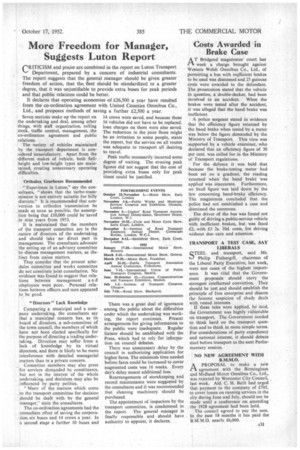More Freedom for Manager, Suggests Luton Report
Page 33

If you've noticed an error in this article please click here to report it so we can fix it.
CRITICISM and praise are combined in the report on Luton Transport `•-•" Department, prepared by a concern of industrial consultants. The report suggests that the general manager should be given greater freedom of action, that the. fleet should be standardized to a greater degree, that it was unjustifiable to provide extra buses for peak periods and that public relations could be better.
It declares that operating economies of £26,500 a year have resulted from the co-ordination agreement with United Counties Omnibus Co., Ltd., and proposes methods of saving a further £2,500 a year.
Seven sections make up the report on the undertaking and deal, among other things, with staff organization, rolling stock, traffic control, management, the co-ordination agreement and public relations.
The variety of vehicles maintained by the transport department is considered unsatisfactory. Apart from the different makes of vehicle, both fullheight and low-height types are maintained, creating unnecessary operating difficulties.
Orthodox Gearboxes Recommended
"Experience in Luton," say the consultants, "shows that the turbo-transmission is not entirely suitable for hilly districts." It is recommended that conversion to orthodox transmission be made as soon as possible, the assumption being that £10,000 could be—saved in nine years from 1953.
It is maintained that the members of the transport committee are in the nature of directors of the undertaking and should take no direct part in management. The consultants advocate the setting up of an advisory committee to discuss management matters, as distinct from union matters.
They consider that the present schedules committee and works committee do not constitute joint consultation. No evidence was found to suggest that relations between management a n d employees were poor. Personal relations between officers and men appeared to be good.
"Directors" Lack Knowledge Comparing a municipal and a company undertaking, the consultants say that a municipal concern has, as its board of directors, a sub-committee of the town council, the members of which have not been elected specifically for the purpose of directing a trading undertaking. Direction may suffer from a lack of knowledge by its virtual directors, and there is likely to be more interference with detailed managerial matters than in a private concern.
Committee members may also press for services demanded by constituents, but not in the interest of the whole undertaking, and decisions may also be influenced by party politics.
" Many of the matters which come to the transport committee for decision should be dealt with by the general manager," state the consultants.
The co-ordination agreements had the immediate effect of saving the corpora tion six buses and 14 crews a year. In a second stage a• further 10 buses and 14 crews were saved, and because these 16 vehicles did not have to be replaced. loan charges on them were also saved. The reduction in the joint fleets might be an irritation to some people, states the report, but the service on all routes was adequate to transport all desiring to travel.
Peak traffic necessarily incurred some degree of waiting. The evening peak figures did not suggest that the cost of providing extra buses only for peak times could be justified.
There was a great deal of ignorance among the public 'about the difficulties under which the undertaking was working, the report continues. Present arrangements for giving information to the public were inadequate. Regular liaison should be established with the Press, which had to rely for information on council debates.
There was unnecessary delay by the council in authorizing application for higher fares. The minimum time needed before fares could be increased to cover augmented costs was 16 weeks. Every day's delay meant additional loss.
Rearrangements of storekeeping and record maintenance were suggested by the consultants and it was recommended that cleaning machinery should be purchased. The appointment of inspectors by the transport committee, is condemned in the report. The general manager is finally responsible and should have authority to appoint, it declares,




















































































